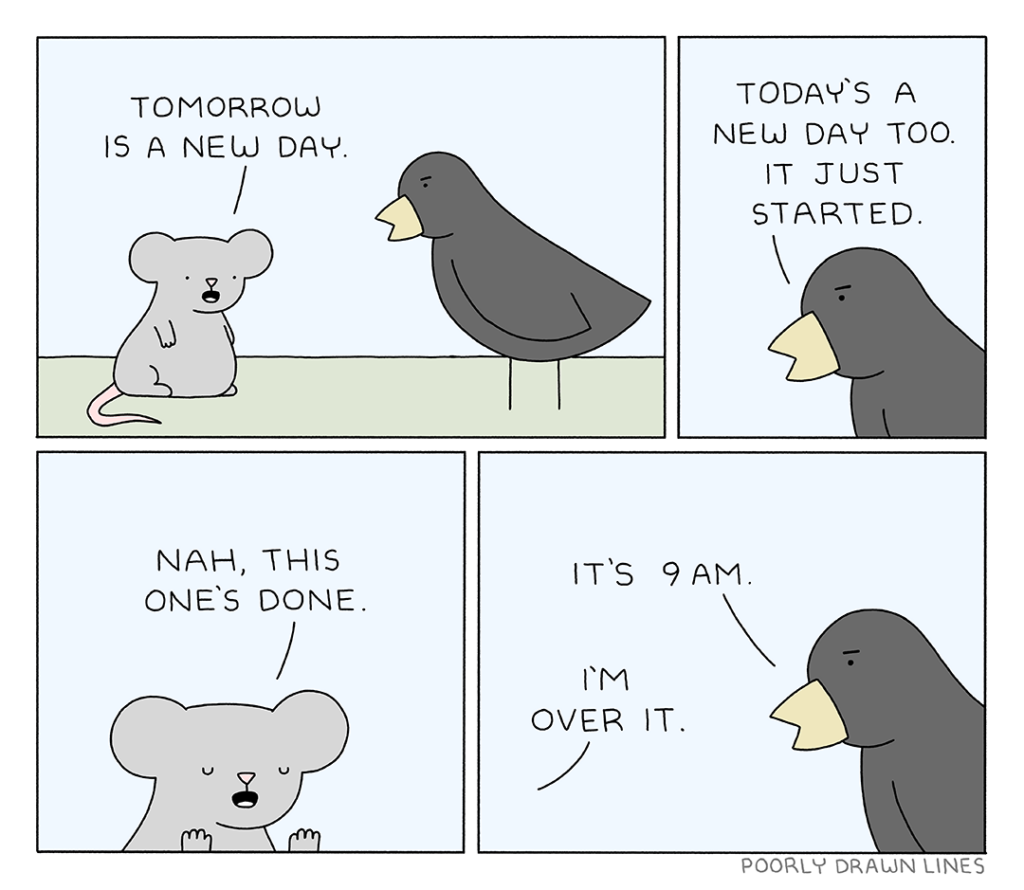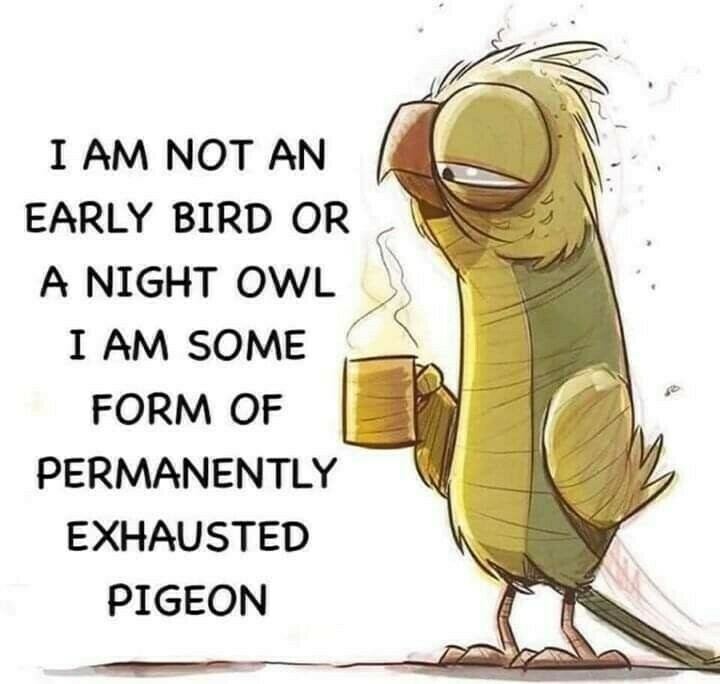- Retreat. Take a step back from the situation, whether that’s physically leaving or mentally retreating.
- Rethink. Is there another way I could look at this situation? Are my emotions proportionate to the situation, or am I making a mountain out of a molehill? How does this situation look from the other/another person’s perspective?
- Respond. Reacting and responding are two different things. Reacting is much more automatic, and it’s when we let our emotions dictate our actions. Responding means that we’re being mindful of our words and actions moving forward.
Small steps are still progress
This image by Hayley Murray had to illustrate this particular entry. It called my attention from the very moment I found it, earlier today, while browsing Unsplash for a completely different purpose.

“Small steps are still progress" is quite a meaningful sentence to me. It instantly made me think of Kaizen, a Japanese continuous improvement philosophy that teaches us how to get better at something by establishing a goal and breaking the needed actions in gradual and incremental steps. So if one wants to walk 10km a day, but is not used to doing so, one first walks 100m a day until properly used to doing so, before defying longer distances. And if 100m is too much, then start with 50m. 25m. Getting used first, by repeating it in an everyday routine, is exactly taking small steps and making progress towards the final goal.
As I've recently come to work in a business area completely new to me, remembering small steps are still progress is key. I've met lots of very nice professionals who excel at what they do, things that I also need — and want to properly learn how — to do. But the difference between them and me is that they've got years of experience in those activities. So it will take time for me to run the same 10 daily kilometers they do — and that's ok, no matter how many times my anxious mind wants to tell me or convince me of the opposite. I need to keep in mind that for now, running my 100m is enough, even though it might seem too little. Small steps are still progress, and slowly progressing will pay off in the long run.
Aw, snap!

I've always been so careful about all my websites. Always. Never before I lost any data from any of the ones I've maintained over the years… I even have a static version of the longest running blog I kept until I decided to retire it — and I still intend to unarchive it and recover the most interesting stuff, if any.
But then excitement got in my way.
I've mentioned the Pods plugin in my latest weeknote, and how I've seen the wonderful things it made possible in a website I also mentioned there. So, moved by pure excitement, I've been experimenting with the plugin, as my colleagues from the IT department would say, straight in the production environment.
Kids, don't do this at home.
Long story short, I applied a couple of settings that went wrong and, when I saw what happened… puff! went all my posts down the drain. Of course the first thing I did was to log into my cPanel to recover my database backup…
…which was NOT enabled.
Aw, snap. I was taken victim of Murphy's Law and I feel I owe all my readers (the one dozen of them), a sincere apology, as I've messed things up.
I spent this Sunday's early morning up, recovering whatever I could, setting up proper backup measures and safeguarding my data. My weeknotes, written from either Obsidian or Drafts, were the first ones back up. Other posts I had written in the same means also came back right after them. I had less than 130, but each had to be restored manually, a real nightmare. And a whole lot of them, without backups, had to be retrieved from the cache of sites like The Internet Archive, Google, Bing and others.
Like I said. Real. Nightmare.
There are a couple of posts that I've redrafted so I can recover the images I used. Some others went back online but stripped from images. I got tired. I also changed the permalink structure of the posts in preparation for the changes I still intend to process here as I get better acquainted with Pods. Please forgive me for any trouble.
There's also something terribly wrong with the ActivityPub here. So I beg my 10 subscribers to stop following daniel@danielsantos.org in the fediverse and following it again — I myself needed to do it, but I haven't figured out just yet why is this that new posts are NOT being sent Mastodon way. I guess I'll need help from someone more experienced — so if by any chance you are that person, please help me.
Bear with me. I've learned this lesson. And I want to improve things here the best I can. They will improve.
Aw, snap…
Sobre jardins digitais
Já tem algum tempo que eu flerto com a ideia de jardins digitais. Acho o máximo a forma que cada jardim digital adquire, porque o conteúdo depende da vontade única e exclusiva de quem está cultivando pensamentos e ideias, e interconectando pensamentos.
Eis que me deparei hoje com o Untitled Presentation, um projeto das irmãs consultoras em estratégia de comunicação, Anna e Kelly Pendergrast, Juntas, desde dezembro de 2018, elas têm construído uma coleção de pensamentos e ideias, como forma de realizar um experimento de pensar em público. E o mais interessante: elas estão usando um deck de apresentações do Google Slides, em que vão acrescentando um novo slide por semana.
A ideia ocorreu às irmãs depois que tiveram contato com duas crianças de 8 anos de idade, que usavam o Google Slides para trocar fotos de carros entre si depois da aula. E hoje já são centenas de slides diferentes.
O que vai no jardim digital delas é exatamente o tipo de ideia que eu tenho, e que tento registrar no meu wiki: ==ideias que são maiores do que aquilo que caberia em uma postagem de rede social, mas ainda não significativas o suficiente para se tornarem um artigo, ou post no blog==.
Book peevishness
I found this Mastodon post by user Danie Ware, where she mentions her pet peeve about book reviews quite interesting:
Pet peeve:
A book review is a review of the book. You read the book, and you write down whether you liked it or not.
It is not:
Whether the postman bought it on time
How it was packaged
If it was left out in the rain
Whether your local store had it in stock
The publisher’s selling policy
What kind of paper the pages were…Etc.
Why is this a difficult concept?
It instantly got me thinking how I both totally agree and disagree with her opinion at the same time.
On the one hand, one’s thoughts about the storyline, the characters and the writer’s ability to give you the next page turner or the worst thing you’ve ever read is exactly what the core of a written book review is, and that’s the kind of informed opinion I’m after whenever I feel like reading a new book. I look for confirmations and, in that sense, want to know how far my expectations could go if I read a new book.
But, on the other hand, I simply cannot think of a book disregarding its handling and packaging. The quality of its cover, its printing, the fonts used and its adaptation to my language, for instance, if I’m reading a translated work. I mean, how could I fully enjoy my experience with the best plot ever in my hands if the font is horrible or there are typos, translation or printing errors? How less amazing would it be to read a new book when it’s torn or crumpled? I don’t know. Just like driving the fastest car ever made while it is all dirty?
Don’t get me wrong. I totally understand Danie’s point of view. I just guess a book’s review should be split in two parts, say, the story part, plot, writing and author originality included; and the user experience part, embracing shipping, delivery, quality and anything else related.
As (almost) everything must be paid for twice, it is only fair to be able to evaluate both these parts. After all, no matter how well written and innovative a book is, you might not be able to pay the second time for it, that is, engage in the effort and the initiative required to collect the benefits one would have after the reading is done something already hard in itself, only turned even harder due to any book mistreatment.
But this is only my pet peeve, and you’re free to disagree — or not.
Forget before you learn
While looking for new ways to learn Japanese and to figure out how to make it stick better in my mind, I came across this video by Bunsuke, where he says he’s never used Anki either to learn or to recall new Japanese vocabulary. That got my attention because I have probably the biggest defender of Anki right here, at home: my older son loves Anki and never gets tired of saying how it has done marvelous things for his Japanese learning along the latest 3 years, and how I’m wasting my time for not trying it, and sticking to it.
The thing is I don’t feel Anki is cut out for me or adequate to the way I usually learn new things, be them languages or not. Meanwhile, right at the beginning of the video I watched, Bunsuke mentioned something that I truly believe when it comes to learning something new:
"I'm completely okay with forgetting. I think forgetting is just part of the process of learning and so I don't really beat myself up over it if I forget a word or forget a kanji. If it's important, it'll come up again"
His relaxed attitude towards forgetting, considering it a natural part of the learning process was really welcome and comforting to me. Bunsuke doesn’t worry about forgetting words or kanji, and this is because he believes important information will resurface through repeated exposure. As his video goes on, he says his learning involves basically two activities: reading and writing down unfamiliar words. Something else I found resonating was that, for him, reading is a form of spaced repetition in itself, rendering Anki not better than reading and recording unfamiliar words and kanji.
The thing is… we will all forget before we learn something. So if, and when it happens, it’s ok. What I do is to keep trying to expose myself to Japanese as much as I can as I try to learn. I’m totally conscious my exposure time is not as big as my son’s, but this is because he’s been dedicating to studying, and only studying, while I have my work duties and a lot of other matters going on. Still, I’m really committed to learning a little every day, even if it means only a couple of minutes (luckily, I’ve been able to do it longer). As for not using Anki, maybe I have an oldschool mindset, maybe not. The thing is, for me, reading and writing down anything I don’t yet know really helps with the learning. I feel that’s what I’ve been doing all my life.
I found out that Steve Kaufmann, a Canadian linguist who currently speaks 20 languages and is an authority in language learning, talks about forgetting languages on a recurring basis in some of his YouTube videos. He says he personally looks for language exposition through reading (and listening to) lots of content, and that this regular exposure to the language makes it quickly revive when needed — so knowing someone as renowned as him also believes important information will resurface through repeated exposure is also comforting to me.
My son doesn’t give Anki all his trust out of the blue. Anki has indeed been the tool that proved crucial for him to gain all the vocabulary, fluency and understanding he conquered in Japanese. This means there’s nothing wrong with using Anki. But his stance regarding Japanese resembles a duty, as he’s dreamed of studying and living in Japan for quite sometime now (and again, I love and admire him for his bravery in doing it this way). On the other hand, although I am learning Japanese for some reasons, I want to do it having fun along the way — meaning that the moment it starts to feel as a chore for me, it will be the moment I quit.
Forgetting words and phrases as part of my learning process has happened to me, and it has been fun. I’ve just got to take a leap of faith while learning, as I’m sure the commonplace between me, Bunsuke and Steve Kaufmann is embracing the idea that forgetting will help building some kind of knowledge reserve that can be retrieved and relearned later. I know it sounds most unbelievable to trust in vocabulary eventually sticking, but I’m sure it will. So that’s why, Anki apart, I believe no one should worry about forgetting along the path of learning.
The case for stuck glasses

When I was younger my maternal grandmother lived with us. As my parents both worked, she helped raising both my sister and I. It’s been some years now that she’s no longer with us, but among many memories that I’ve got of her, there’s a particular keepsake, a Danone cream cheese glass cup featuring Bugs Bunny, part of a bigger collection, that she kept for me as a gift — I’ve always loved Looney Tunes.
Everyone in my family knows this one glass is special for me: although I don’t forbid anyone to use it, they all know they must take as much care as they possibly can to handle it, specially when it’s time to do the dishes.
Now join this piece of information with another one: our dish rack isn’t the biggest one, so sometimes cups tend to be piled up while drying.

Fast forward to last weekend. My son was doing the dishes as he so many times does, and piled up some glasses in the rack we have here, among which my special Bugs Bunny keepsake. Needless to say Murphy striked that very moment — and my glass got stuck with another one, pretty much in the fashion pictured at the top of this text.
Now, I’ve been there before. Some glasses we had got broke the moment we tried to separate them, in similar situations. Knowing this could happen, I couldn’t afford that happening with that glass. That’s when I went to YouTube looking for ways to properly separate two stuck glasses.
And I found an answer, thanks to the Manual do Mundo YouTube channel. This is one of the most famous Brazilian channels, dedicated to science and experimentations in general, and thank God there was a video teaching how to use simple physics to separate glasses.

For anyone out there undergoing the same situation, despair not. All you gotta do is fill the glass on the top with ice cubes and water, so it gets cold and starts contracting. At the same time, heat water inside a ceramic mug for about 40 seconds so it gets warm and dive the bottom glass inside, so it starts to get hotter, dilating.
In practice, the coldness will make the top glass wall temporarily narrow, and the bottom glass temporarily widen. After approximately 30 to 45 seconds, all you’ve got to do is to gently pull the top glass out of the bottom one, releasing it in a very nice and practical physics demonstration.
The language of the infinite
“Japanese is very simple to speak compared with other languages. There are no articles, no ‘the,’ ‘a,’ or ‘an.’ No verb conjugations or infinitives…Yukimasu means I go, but equally you, he, she, it, we, they go, or will go, or even could have gone. Even plural and singular nouns are the same. Tsuma means wife, or wives. Very simple.”
Mariko, in James Clavell’s Shōgun
“Well, how do you tell the difference between I go, yukimasu, and they went, yukimasu?”
“By inflection, Anjin-san, and tone. Listen: yukimasu—yukimasu.”
“But these both sounded exactly the same.”
“Ah, Anjin-san, that’s because you’re thinking in your own language. To understand Japanese you have to think Japanese. Don’t forget our language is the language of the infinite. It’s all so simple, Anjin-san.”Mariko, in James Clavell’s Shōgun
Tsundoku
Interessante como foi só eu começar a estudar japonês e já cruzei com um termo interessante — e inexistente em outros idiomas, graças a um artigo da Open Culture de julho de 2014 que alguém postou na timeline local da instância do Mastodon em que eu estou, essa semana.
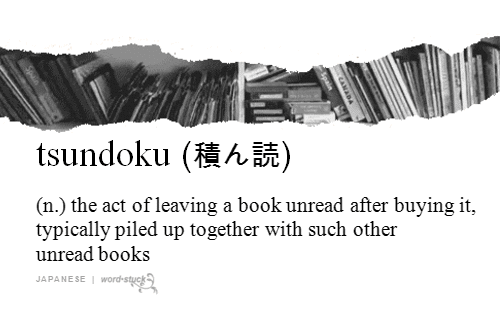
Me identifiquei na hora — e não apenas por conta da palavra que existe só em japonês, 積ん読, ou tsundoku, como no título deste post — porque sou um acumulador de livros confesso, tanto que tenho uma camiseta com a seguinte citação, que dizem ser atribuída ao escritor americano Daniel Handler, que também atende pelo pen name de Lemony Snicket:
“It is likely I will die next to a pile of things I was meaning to read.”
Lemony Snicket
É de fato provável que eu seja encontrado morto próximo de uma pilha de coisas que eu pretendia ler. Frase que ilustra com perfeição o termo tsundoku, que, afinal de contas, representa o ato de comprar livros e deixá-los acumular em pilhas, sem que tenham sido lidos.
A palavra, pelo menos de acordo com o artigo, data do começo da era moderna japonesa, chamada de era Meiji (1868-1912). Tsundoku, que em tradução literal significa pilha de leitura, e se escreve 積ん読. Tsunde oku significa deixar algo formar uma pilha, sendo escrito como 積んでおく. Alguém na virada do século parece ter trocado oku (おく) em tsunde oku por doku (読) – que significa ler. E como — ainda de acordo com o texto do artigo — tsunde doku é difícil de dizer, a palavra foi mexida para formar tsundoku.
Se a história da formação da palavra é real ou não, o que ela representa não deixa de ser verdade. Mesmo no meu caso específico, em que as pilhas se formam mesmo através dos arquivos de e-books que eu tenho armazenados no meu Kindle e no Bookfusion.
Porquê eu quero aprender japonês
Prólogo
Quando eu era adolescente, tive a chance de fazer um teste vocacional, que eu sinceramente acredito que todos deveriam ter a chance de fazer, já que uma oportunidade dessas pode nos ajudar a ter uma noção sobre habilidades que temos, coisas das quais gostamos ou com as quais temos facilidade, e que podem nos ajudar no futuro.
Do resultado do tal teste vocacional confirmei algo do que eu já suspeitava: tenho facilidade em aprender idiomas! Naquela época eu estava igual ao Eduardo, nas aulinhas de inglês. E as aulinhas de inglês eram algo que eu adorava, não apenas porque gostava de aprender tudo que pudesse absorver (lembrem-se que não havia internet no início da década de 90, e os recursos eram limitados!), mas porque eu sinceramente achava fácil aprender. E aproveitando tal facilidade e as consequentes fluência e proficiência que ela me trouxe, depois de me formar acabei indo dar aula na mesma escola de inglês em que estudei.
Anos depois, trabalhando em uma grande empresa em que uma das filiais estava na França, fui aprender francês, estudando com alguns amigos. Nunca obtive a mesma fluência do inglês — talvez pela falta de tempo livre e pela correria —, mas consigo ler razoavelmente e até arriscar algumas frases em conversa. Mas o mais importante disso é dizer que só topei o desafio porque tenho essa facilidade com idiomas. Graças a isso, também, arranho muito de leve um pouco de espanhol, onde minha dificuldade eterna é pronunciar o erre de palavras como rojo.
Meus filhos e o inglês
Como eu disse, não existia internet na década de 90. Situação bem diferente daquela das décadas seguintes, a dos anos 2000, quando meu filho mais velho nasceu, e a dos anos 2010, quando o mais novo nasceu. O mais velho chegou a estudar inglês igual a mim, não em uma, mas em duas escolas de rede, de âmbito nacional, sendo a segunda a mesma onde me formei e dei aula.
Até que ele pediu pra parar de fazer inglês. Me disse que não sentia necessidade, que já aprendia bastante através da internet, YouTube, podcasts e mais uma série de outros inputs. Naquele momento eu me senti meio em choque, porque meu racional inicial era de que, se eu tinha aprendido inglês através de uma escola de idiomas formal, nada seria mais natural do que ele seguir o mesmo caminho, certo?
Errado. Totalmente errado. As escolas de idiomas continuam sendo relevantes, mas os tempos mudaram. Meus dois filhos já nasceram praticamente on-line, e de fato foram expostos desde muito cedo a uma infinidade de inputs, muito mais do que eu. De fato, pensando melhor a respeito, conclui que não apenas o meu filho mais velho, mas também o mais novo, aprenderam inglês muito bem sem a necessidade de ensino formal. Igual ao que eu fiz, aliás, quando fui aprender francês e espanhol, já que nunca me matriculei formalmente em escola nestes casos.
Foi assim que os meus dois filhos pararam de frequentar escola de inglês… e tudo bem com isso. Ambos hoje se comunicam muito bem no idioma, obrigado.
Meu filho mais velho e o idioma japonês
Um belo dia, alguns anos atrás, o meu filho mais velho começou a se interessar por cultura japonesa. Algo que muita gente nos últimos anos tem cultivado, aliás.
Basicamente, a cultura japonesa altera algumas palavras da minha infância: não é mais gibi, é mangá e não é mais desenho animado, é animê (pus esse acento aí só pra mostrar a pronúncia correta, ele não faz parte da grafia). Além disso, como em qualquer outra cultura que é compartilhada atualmente, há músicas, YouTubers, jogos de videogame e literatura juvenil — cujos livros não são mais romances de literatura juvenil também, e sim, light novels.
A questão é que ele evoluiu nessa cultura, e com o tempo, não bastou mais pra ele consumir conteúdo em português ou inglês. Ele queria o raw material, o acesso direto ao original. Para isso, então, foi estudar japonês. E me pergunte se ele pediu pra fazer curso formal do idioma?
Claro que não. Quando vi, ele já havia pesquisado tudo de que precisava: foi atrás de gramática japonesa, foi atrás de várias referências que encontrou na internet e, muitas e muitas horas de exposição ao japonês depois, quase três anos se passaram.
Eu tenho que dizer, neste ponto, que embora meu filho nunca tenha mencionado ter passado por nenhum teste vocacional na escola, tal como ocorreu comigo, arrisco dizer que, possivelmente, ele pode ter herdado o gosto por — e talvez até a facilidade com — idiomas de mim. Some-se a isso toda a dedicação e obstinação que ele empreendeu (e continua empreendendo) com o idioma e você tem o resultado que ele conseguiu, do qual me orgulho muito.
No final de 2021 meu filho começou a falar em estudar no Japão, em fazer faculdade por lá. Esta foi outra ocasião que me deixou em estado de choque. Para mim, estudar longe não era novidade — várias pessoas que conheço têm filhos que estudam em outros estados e regiões brasileiras, alguns têm filhos no exterior, mas em locais como Canadá ou Estados Unidos. Eu nunca imaginei mandar meu filho pro Japão.
E no entanto, ali estava ele, com essa meta.
Mais uma vez, isso me levou a refletir muito. Meu filho, em paralelo, descobriu um programa de bolsas de estudo oferecido pelo Ministério da Educação, Ciência e Tecnologia do Japão (MEXT), e me disse que poderia e gostaria de tentar se candidatar a uma bolsa de estudos deles. Ele nunca deixou de se dedicar a isso, ele nunca parou de estudar.
Em 2022, depois de concluir o ensino médio, ele pediu para tirar um ano sabático. Ok, ele não me disse isso exatamente dessa forma, mas o que pediu foi para se dedicar por um ano a prestar a prova do MEXT, e a prestar um exame de fluência em japonês, o JLPT, oferecido pela Fundação Japão, para o qual o paralelo mais próximo que consigo traçar é a similaridade com o TOEFL.
Se ele não conseguisse o que almejava até o final de 2023, como plano B, entraria numa faculdade aqui no Brasil mesmo, para não prejudicar seu ensino superior enquanto estivesse se preparando para tentar de novo. Até conseguir.
Eu sempre acreditei que as coisas dão certo pra quem acredita nelas. E as coisas estão indo bem — nos últimos tempos, tenho falado bastante a respeito nas minhas weeknotes. Tudo, graças a Deus, parece muito promissor. O que, finalmente, me leva à resposta, ao porquê de eu querer aprender japonês.
Os meus motivos
A essa altura do campeonato fica até fácil de entender a minha motivação para aprender japonês. Com meu filho na iminência de viajar para o exterior, e talvez, após concluir seus estudos, fixar residência definitiva por lá, eu imagino diversas possibilidades — embora, como diga o ditado, “o futuro a Deus pertence“.
Penso que pode haver uma ponte se formando entre a nossa família e o país nipônico. Quando esta ponte estiver efetivamente formada, haverá chance deste que vos escreve de visitar o Japão. E aí está meu motivo mais primordial: poder interagir com o povo japonês sem necessariamente depender de ninguém (ainda que, obviamente, eu planeje pedir uma ajudinha ao meu filho).
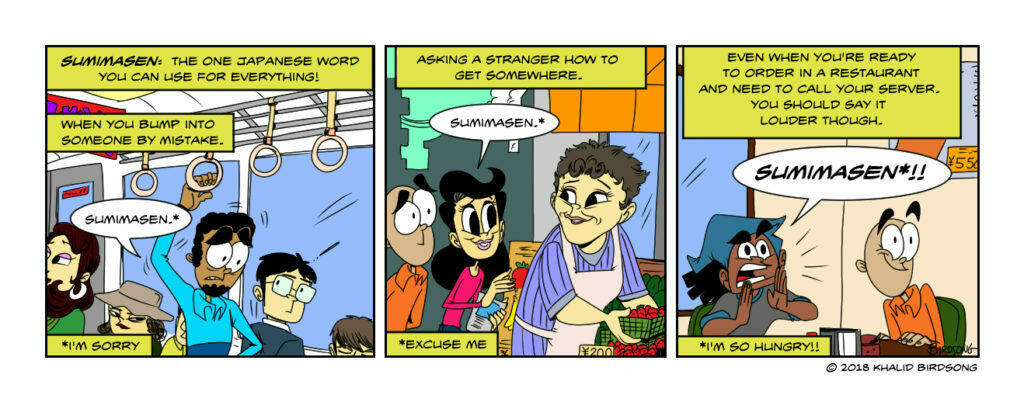
Essa história toda me fez refletir: no começo eu tinha receio de meu filho estudar longe (digo, tão longe assim). Mas a gente cria os filhos para o mundo e, como percebi com o passar do tempo, a educação dos meus pais foi diferente da educação que eles me deram, e a educação que eu dei — e ainda estou dando — aos meus filhos é diferente daquela que eu e minha esposa recebemos. Então me sinto, agora, mais recentemente, na obrigação de regar os sonhos do meu filho, pra que eles possam florescer.
Se isso significa em um futuro breve construir mesmo uma ponte entre nossa família e a terra do sol nascente, nada mais apropriado que colocar em prática a minha boa e velha facilidade com o aprendizado de idiomas, não é mesmo?
E aprender japonês será um grande desafio pra mim.
Primeiro, porque não tenho todo o tempo que meu filho pôde dedicar — e continua dedicando — ao aprendizado do japonês. Não posso me dar ao luxo de tirar um ano sabático, e minhas horas livres são mais escassas. Então vou ter que achar espaço pro meu aprendizado pessoal começar a acontecer.
Segundo porque, como você já deve imaginar, aprender japonês parece — e efetivamente deve — ser mais trabalhoso do que aprender um idioma como inglês, francês ou espanhol: por exemplo, há três alfabetos distintos, hiragana, katakana e kanji. Há toda uma sequência gramatical e uma estrutura do idioma que são diferentes daquilo com que estou acostumado.
Comecei uma jornada na qual, conforme eu disse ao meu filho, quero antes de qualquer coisa, aprender a ler em japonês. Esse é o meu objetivo principal, o meu foco, a minha meta. O que virá depois disso? Não sei e não estou preocupado com isso, pois tudo dependerá da ponte entre nós e o Japão. Mas uma coisa eu sei: já estou e pretendo continuar me divertindo no processo.
Ao filósofo austríaco Ludwig Wittgenstein, em seu Tratado Lógico-Filosófico, é atribuída a frase “Os limites da minha linguagem são os limites do meu mundo“. Embora existam várias interpretações possíveis para o que ele disse, gosto de pensar que quanto mais idiomas eu aprendo, mais minha linguagem e maneira de me expressar se fortalecem, o que amplia os limites do meu mundo e da minha cultura.
Assim quero que seja, portanto, comigo e com o idioma japonês: que, ao aprendê-lo, aos poucos e com cuidado, ele permita que eu amplie meus horizontes. Tenho certeza de que isso será muito útil na hora em que eu estiver cruzando a ponte — na primeira vez, ou nas vezes subsequentes.
Passarinho
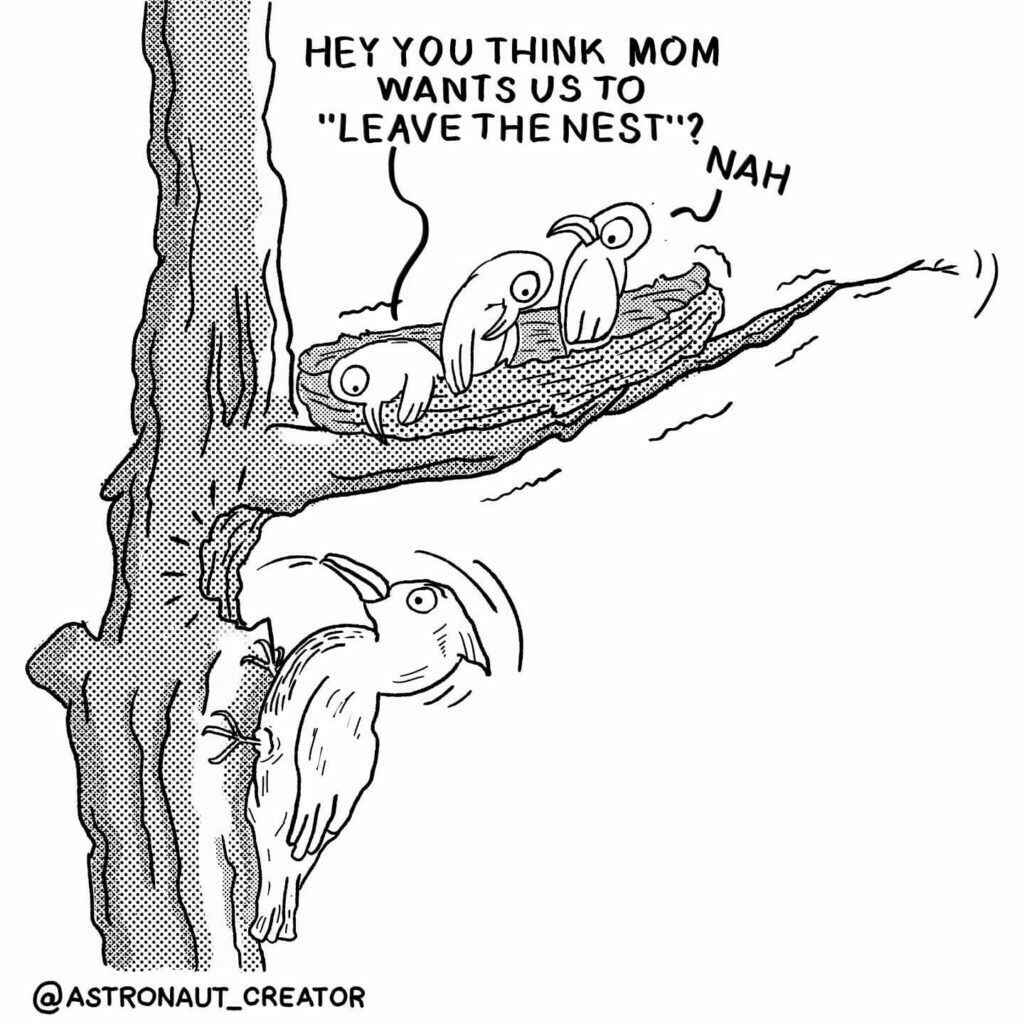
Acabei lendo uma notícia hoje, sobre o que se deve fazer com filhotes de passarinho que a gente encontra caídos no chão, que me remeteu à lembrar instantaneamente de uma experiência prática que tivemos com o assunto, aqui em casa, alguns anos atrás.
✱✱✱
Em março de 2016 eu cheguei em casa do trabalho e o meu filho veio me contar sobre um filhotinho de passarinho que ele tinha achado, caído na calçada, aqui na frente de casa. O bichinho parecia machucado, não me lembro agora se nos pés ou na asa, mas o fato é que a debilitação estava ali, e ele não conseguia voar.
Provavelmente o passarinho, um filhotinho de pomba — conforme fui informado posteriormente, pois até então para mim era um pardal —, devia ter caído do ninho. Meu filho, que sempre demonstrou gostar muito de animais, ajeitou o bichinho em uma caixa de sapato forrada com jornal na nossa área de serviço e tentou, até conseguir, dar água pra ele através de uma seringa. Ele também conseguiu dar migalhinhas de pão pro passarinho.
Enquanto estes cuidados paliativos aconteciam, a gente foi tentar identificar onde podíamos levar ele, porque não tinha como ficar com ele em casa. Depois de falar com alguns veterinários e de contar com a ajuda da minha irmã, identificamos que uma das universidades aqui da cidade possuía um CRAS — Centro de Reabilitação de Animais Silvestres. Assim, depois de passada a noite com o passarinho hospedado aqui em casa, fui até o local com meus dois filhos, com a missão de deixá-lo em mãos que pudessem fazer mais por ele do que nós. E foi lá que me informaram que ele devia ter caído do ninho onde estava, e que na verdade, ao contrário do que eu imaginava, era um filhotinho de pomba, e não um pardal.
O final da história foi feliz. Felizmente deixamos o bichinho com quem podia cuidar dele de uma forma mais apropriada. Depois dos cuidados que seriam prestados, fui informado, aliás, que o passarinho seria devolvido à natureza, que é o lugar dele, afinal. Gostei de fazer essa boa ação, e como tenho dó de bichinhos abandonados, me senti duplamente recompensado na situação, e todos ficaram felizes, incluindo meu filho.
✱✱✱
Curioso em saber se tínhamos feito a coisa certa, apesar do final feliz de anos atrás, li a notícia completa. E descobri que, sim, fizemos o que era esperado. Encaminhar bichinhos com lesões, como no caso do filhotinho, para um centro de recuperação. Temos muita sorte em ter uma instituição do gênero aqui na cidade. 😊
Dragon Wing
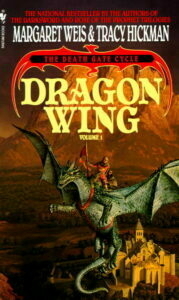
Yesterday, I finished reading Dragon Wing, the first of the seven books that are part of the Death Gate Cycle, an adult fiction series created by authors Margaret Weis and Tracy Hickman during the 1990’s.
The whole series is set in a fantasy world where magic and technology are divided into five separate realms. The story depicts several fantasy races and cultures, including humans, elves and dwarves, but centers on races created by the authors, namely the Sartan, an ancient race of powerful wizards, skilled in the use of both magic and technology, who possess the ability to shape reality according to their will, who created the Death Gate, a portal that separates — and connects — the world into five realms; and the Patryn, a race of outcasts and rebels, skilled in the use of runes which allow them to manipulate reality through language and symbols, all of them banished to the Labyrinth by the Sartan.
Dragon Wing introduces us to Haplo, an assassin from one of the five realms, as he travels through the Death Gate towards the world of Arianus, to prepare for the arrival of his master, the Lord of the Nexus. Meanwhile, Hugh the Hand, an infamous assassin raised by Kir Monks after his mother died, is hired by Stephen, king of the human realm, to have his child, Prince Bane, murdered. Hugh then sets on a journey with Bane, with the excuse of fleeing the prince from its home because he’s being persecuted by people meaning to do him harm, during which they come across Alfred, the Prince’s chamberlain, who followed them in order to protect the child, but who has secrets of his own.
After leaving behind 433 very well-written pages and the first book, I have some thoughts I want to share.
First, considering that I came across this book entirely by accident, after I saw it mentioned in Mastodon, it beats me how come the Death Gate Cycle be seldom mentioned beside other fantasy series such as the LOTR by Tolkien, ASOIAF by George R. R. Martin, or The Wheel of Time, started by Robert Jordan and finished by Brandon Sanderson after the author’s death. After all, all these series share the greatness in storytelling and world building. From the ones I cited, only ASOIAF started to be written after the Death Gate Cycle, so I couldn’t find any explanations on its lack of mention. And it is a shame, I have to say, not seeing it mentioned more often.
Second, as I said before, this first book, at least for me is completely unputdownable. Now, I’m saying this being a non-native English speaker. As such, despite the fact of having been an English teacher in Brazil in the past, a good and well-written book with a fluent story considered, it takes me much longer to read books in English than it would in Portuguese, for obvious reasons. As the Death Gate Cycle has never been translated to Portuguese, my only option was to read it in English. Still, it took me only 13 consecutive days to finish reading (mind that I had to stop to do other things, as most everybody, meaning I wasn’t dedicated to reading the book). The story is very fine, so it was converted into a page-turner for me, automatically. And I guess I owe that to the authors, who have been able to wrap their intended plot in such a way that it is rich to the right point (yes, Tolkien, I’m looking at you and your veeeery long scenario and mostly everything else descriptions 😈) besides being filled with plot twists, so I came to the concluding chapters with so many open questions yet, and I loved that everything concluded in a way that seemed only proper.
Third, the Death Gate Cycleshares a characteristic with both LOTR and The Wheel of Time. The fact that these series have all been finished already (yes, George R. R. Martin, I’m looking at you and your unfinished business 😡). As such, it’s much more pleasing to me to have all the books already launched, so I can properly take my reading to an end. Now, I’ve read series while they hadn’t been finished yet (such as the Harry Potter books), but because I saw the commitment the author had to finish it. And I can’t see the same dedication, I’m sorry to say, coming from the author of ASOIAF. But this is not the main topic here.
So, in conclusion, as Limbeck Bolttightener, another of the marvelous characters in Dragon Wing, a dwarf from Drevlin, would say, I felt so compelled to write about my feelings for this book that I needed to do it as soon as possible. And I’d like to totally recommend it to anyone out there, interested in adult fantasy fiction books, as I know you won’t regret it. From my part, as I write these closing words, I’ve already started reading the next installment in the series, Elven Star, hoping that the story keeps the pace. I guess I won’t be disappointed.
The Great Wave off Kanagawa
I was browsing my Mastodon feed tonight when I came across this picture, posted by user Henri:
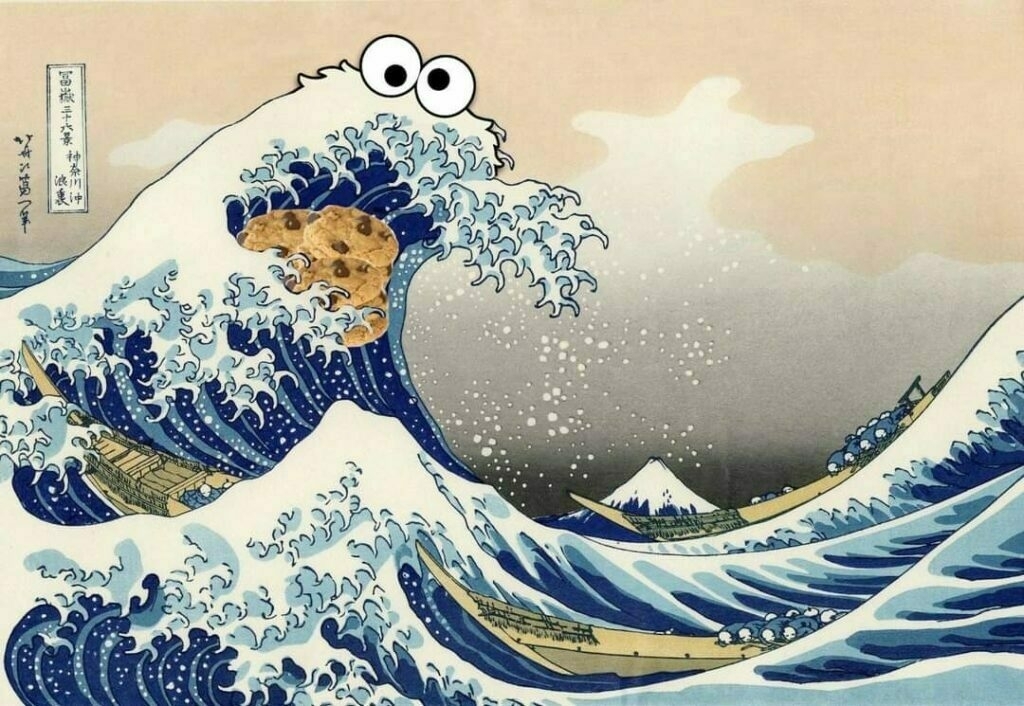
I liked it instantly, but as soon as I gave it a second look, the image looked very familiar to me, and I started to think why. The first thing I noticed was some Japanese kanji on its side. Having my older son studying Japanese, my first reaction was to show him the image, so I could be certain it was really Japanese.
His answer not only confirmed my suspicion, but also revealed why I found the image so familiar. That’s the same one — or nearly — which’s stamped on my Kindle cover:
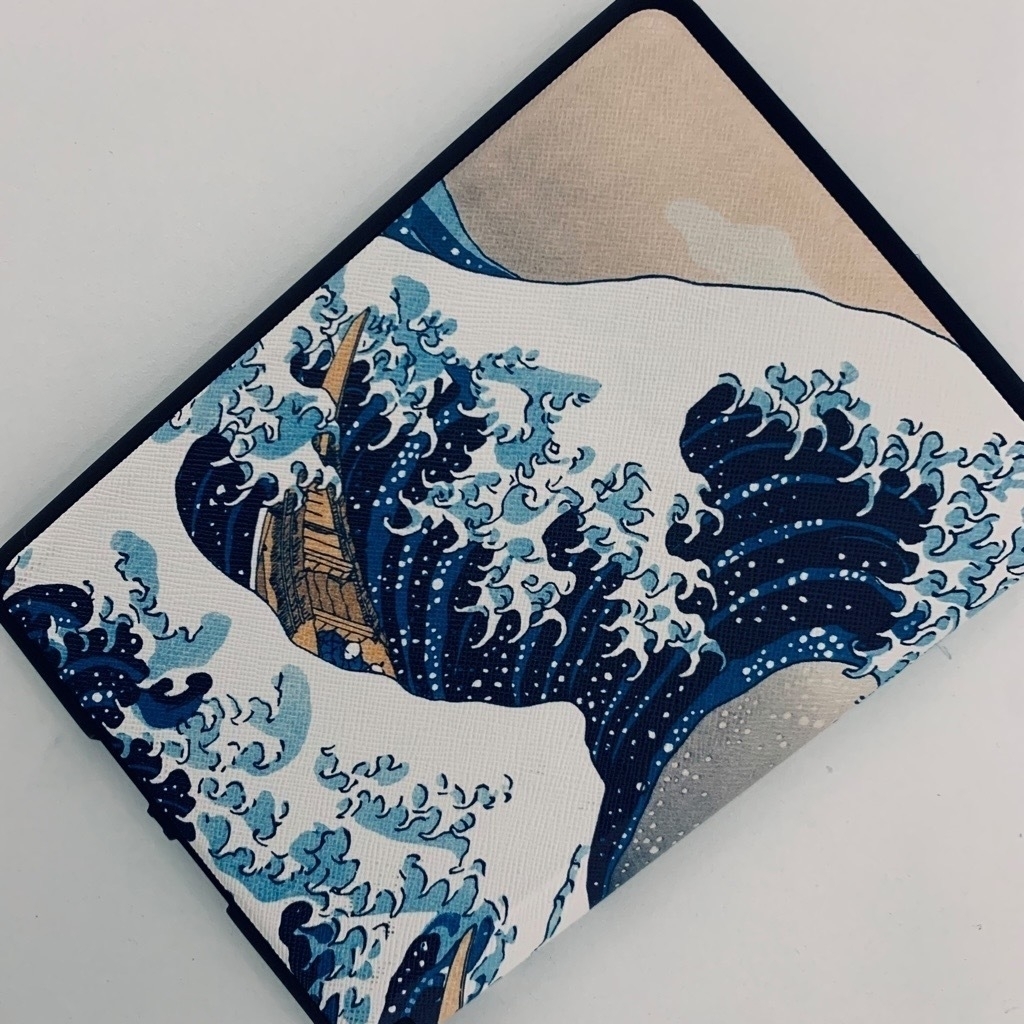
I talked to Henri on Mastodon trying to figure out who created the original image, but he didn’t know. What I did find out talking to him, though, was that the image he posted was generated by someone who used AI to accomplish the feat.
As I wouldn’t be satisfied until finding out who authored the original, I started to look for answers, and fortunately it wasn’t a difficult search. The image happens to be featured in Wikipedia, and is named The Great Wave off Kanagawa. Created in 1831 by Japanese painter and printmaker Katsushika Hokusai, the image is the artist’s most famous piece, and also possibly the most reproduced image in the history of all art, having been featured in t-shirts, shoes, videogame controllers… and Kindle covers like mine. Now, learning that was certainly unexpected to me — but going down that rabbit hole from a Mastodon post was really cool.
Dish-o-therapy
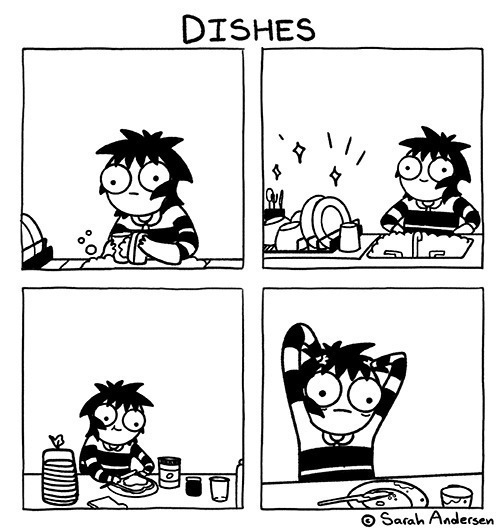
Sarah Andersen recently nailed it when she draw the above comic. Without knowing it, she reminded me of a 2015 Instagram post by Brazilian artist and blogger Ida Feldman, where she prophetically stated that “while you’re alive, there will be dishwashing”, probably the truest statement I’ve ever seen.

I have this love and hate relationship with dishwashing. Although it’s probably more of a hate and hate relationship. As new dirty dishes, forks, knifes, cups and spoons are certain to doom our lives as soon as we finish washing their siblings, I try to put up with this sad reality by using the time the best I can.
Because it’s normally when I’m doing the dishes that I listen to music, watch the news, watch another episode of one of my favorite series or listen to a podcast. As there’s no escape from the dishes to be washed, I only see fit to use my other senses to better serve me.
Years ago there was this TV advertisement here in Brazil where a woman cheerfully danced to something she was listening to on her headphones while doing the dishes. At a certain point the term dish-o-therapy showed up on screen, because, as there’s no use in complaining about dishwashing, turning this moment into a therapy is totally fine.
Late night reading
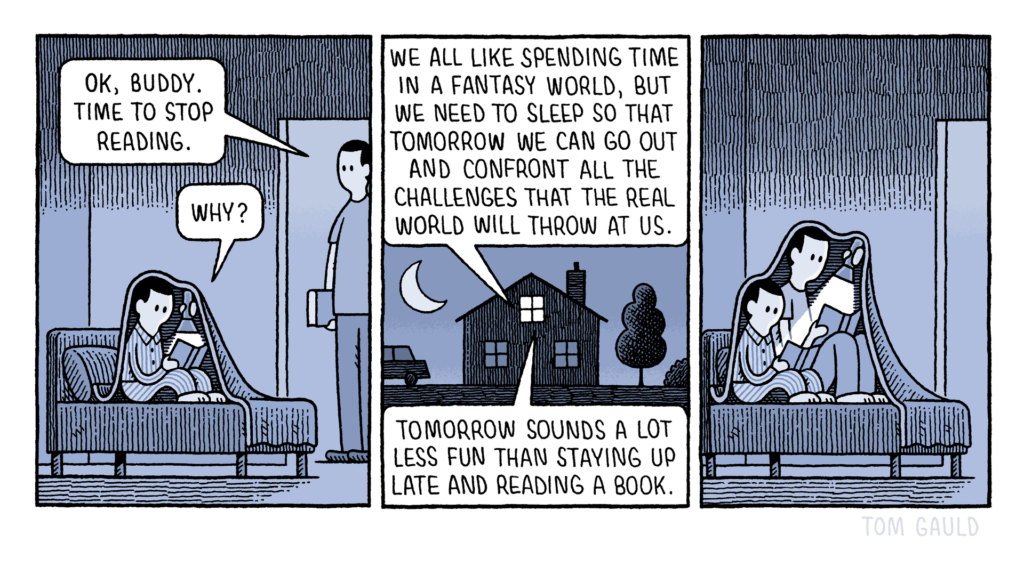
Tom Gauld sent this message yesterday in The Guardian. The only thing people like me, who love reading, can say is that we totally identify with this situation. I feel 100% represented.
▣ via Robert McNess on Mastodon.
On technical obsolescence
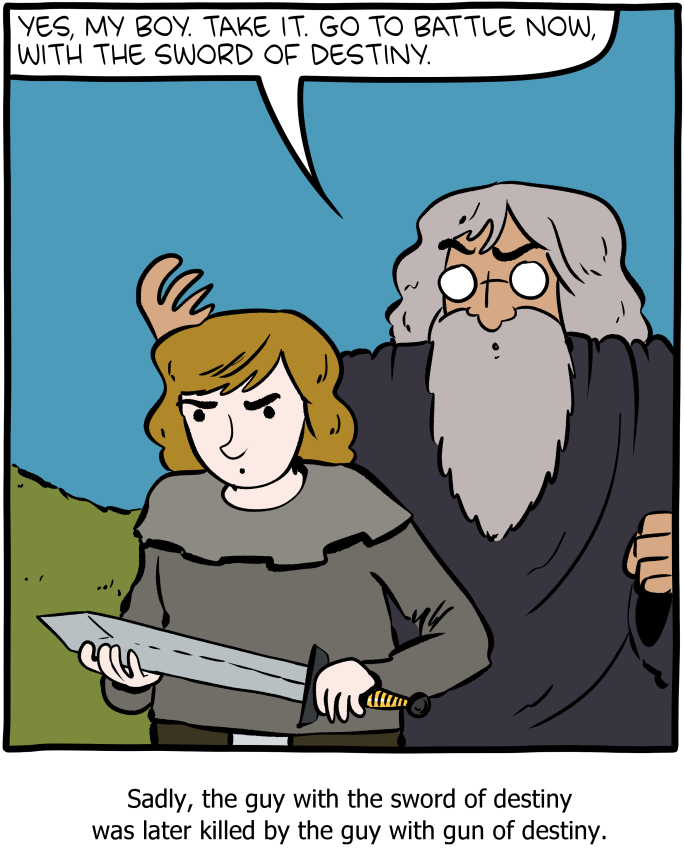
I may be the only person in the world who’s seen this SMBC comic strip and, from the thousands of thoughts I could have had, I thought about… technical obsolescence. And I laughed because of both the comic and the thought.
The therapy of blogging
I came across this text from Christopher Butler today, where he mentions some notes about the act of blogging that he took back in 2010. Parts of his text ringed with me, specially because he mentions the act of writing in a blog as “this experience of being able to express ourselves without any restriction” and the accompanying “awe and excitement of publishing on the web“.
It took me a long time to get back to blogging. In spite of having started to blog somewhere in 2007 or 2008 — that is, fifteen-ish years ago — I later completely walked out on it for many years, first trying to convince myself that it was because of lack of time, but then acknowledging it was because I had lost interest in it for many reasons, depression and anxiety included in the package. I had maintained a website with a blog and some other random stuff and cancelled my hosting plan (although I never cancelled the domain name, and that was good).
Sometime last year it occurred to me that something was missing in my life.
I’ve always liked to write and it’s been sometime now that I’ve been feeling better with myself. This something missing was it, it was to write. Maybe in a blog, maybe not. The thing is, during this same period I came to know about note taking and figured out that was something I’ve always done, just without knowing it had a name. So I came across very fine apps like Obsidian, Logseq and Tangent Notes, all of which I still use on a daily basis to register my thinking. As I wrote my notes locally, I started to consider the idea of writing in a digital garden, publishing some thoughts, but unorderly. I liked this idea. Then came omg.lol, a wonderful service that, among many features, offers image hosting and weblogs: that was enough to awake that feeling of wanting to blog again, so I created a blog there and it was just a matter of time until this blog here was reactivated.
Christopher Butler’s text reminded me of the therapeutic effects that a blog can bring. As he says, with a blog “I can share the part of me that is afraid of dying, the part of me that is ashamed by my own thoughts, jealous of someone else’s success, that loathes myself, that is afraid of being misunderstood; all of the fears and anxieties and little things that twist around in your gut; that if you’re sensitive and smart and insightful enough, you’re managing to deal with; you can exercise these in a different way“. That is, I can share mostly anything, and I guess the secret to keep such blogging therapy a success is to write, first and foremost, to myself, for the fun of it, for the joy of it.
Sitting and writing what’s on my mind, figuring out what thoughts I want to express and shaping such thoughts in a way that makes them readable and understandable to someone else in a blog post format is very nice. And if and when I feel there might be anything else, not suitable in a blog, there’s always the possibility of falling back on streams of thought, private journals and digital gardens. Anything counts, because all of these things, as blogging, are therapeutic as well.
Air
The year is 1984. Michael Jordan, to me the greatest basketball player of all time, is still a rookie, having recently joined the Chicago Bulls as their third overall draft pick, still far from his total of 32,292 points scored in his NBA career.
Yesterday I watched Air, an Amazon Prime movie directed by Ben Affleck and released this week, showing us how Nike executives went after the Jordans to try to turn Michael into their basketball shoes division spokesperson. I had never heard about the movie — until some Brazilian NBA sportscasters talked about it and how it would be release on May, 12. With Dire Straits’ Money for Nothing as the opening tune and many more nice music in the soundtrack, I found the movie plot very interesting.
And Air is not a movie about Michael Jordan. I mean, it’s not his biography. Ben Affleck, by the way, opted for not showing Michael on screen, directly. The director did this out of deference to him, because no one would portray him up to his legend. So it is that actor Damian Delano Young, who plays Michael, barely speaks during the movie, appearing few minutes and always shown from behind. When Michael does appear, it’s through historical footage, that is, using videos from his own games.
So, it is actually a movie about Nike. I didn’t know Nike was the underdog in the basketball shoes industry, I guess much because I’ve always seen Nike as the giant it is nowadays. Back in 1984 it had a very little marketshare, behind Adidas and Converse, the two dominant powers in the market. And Air shows Sonny Vaccaro, a Nike executive working directly with Phil Knight, the company’s co-founder and CEO, pursuing to hire Michael Jordan as a means to flip the industry’s game board — what they get to do, by closing a historical partnership which resulted in the Air Jordan sneakers family.
Now, I’m not a movie critic or a sports expert. But I really enjoyed the movie. It was nice to see how Air Jordans were sneakers customized to Michael Jordan’s feet, maybe the first ones to be made specifically for an athlete — as the movie makes us understand. Until Nike’s move, the athletes signed with Adidas and Converse and used the shoes these companies provided them without custom features.
From a business perspective — and the movie was pure business, it was something fantastic and unprecedented at that time. Along with another unexpected decision, the one of not only offering Michael Jordan a yearly salary of 500,000 dollars, but giving him participation in the sales of the Air Jordans, something that started a new trend, where athletes started to profit from their partnerships with sports companies.
The Jordan brand is perhaps the sneaker market’s most valuable name. When the movie finished, it was possible to understand that Nike targeted earning $3 million dollars in four years. But that figure was far off what really happened — and only in the first year, the shoe was so popular it sold $126 millions. Today, the Air Jordan brand fetches Nike and Michael Jordan $3 million in revenue every 5 hours. That’s amazing, and that’s way the movie makes us understand the beginning of. So, if you have the chance, give the movie a try.
For when you’re feeling emotional
We are all human beings and, as such, emotional beings. Accepting this reality is important, just as much as knowing that a surge of emotions can definitely influence our decisions, acts, and statements. This week, while talking to a friend, he sent me this anonymous saying, which fit like a glove for when we’re feeling emotional. It goes like this:"Never reply when you are angry. Never make a promise when you are happy. Never make a decision when you are sad."
Coincidentally, looking for information about the origins of the saying, I ended up coming across these 3 tips — dubbed the 3R’s for when you’re feeling emotional by the user who mentioned them in Reddit:
